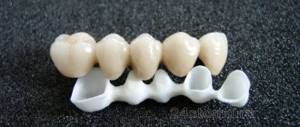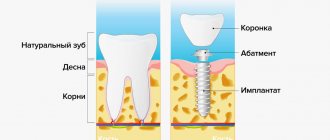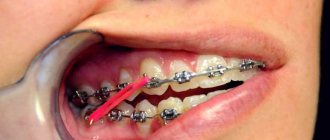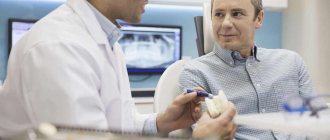Installation of implants today is a widely used method for restoring damaged teeth. This method involves installing a root made of a strong and durable material (for example, zirconium or titanium) in place of the damaged tooth. Then either dentures or crowns are attached to the installed support.
Of course, the method of installing implants, although complex and step-by-step, can solve several dental problems at once. Many patients after dental implantation think about how difficult it is to care for implants, how much time and effort is spent on maintaining them in good condition.
We assure you, there is no need to worry about this. Of course, it is necessary to follow certain rules for caring for implants, but usually our patients quickly get used to the specifics of caring for these new materials.
You can make an appointment with our dentists for a consultation on dental implantation, implant care and calculation of implant installation. If you start treatment on the day of your appointment, your consultation with a doctor will be free . Registration can be made by calling 8 (495) 221-21-18 or using the online registration form. You can read more about implantation here.
How to quickly recover after dental implantation - useful recommendations and what not to do
Article navigation
- Tissue restoration and implant healing
- Normal consequences after implantation
- How to distinguish normal consequences from complications?
- What medications can the dentist prescribe?
- Lifestyle recommendations after implantation
- What can you eat and drink during the rehabilitation period?
- Learn more about caring for implants and the oral cavity
- About traditional medicine
- Is it possible to do MRI and CT with a dental implant?
- How much do drugs and rehabilitation products cost?
- How much does it cost to treat complications?
Question for a specialist
Rehabilitation after dental implantation surgery does not last long, but is a very important step for the successful engraftment of implants and their long-term service.
Rehabilitation after dental implantation includes a whole range of various measures - drug therapy, oral care, a special diet and some short-term restrictions in the usual lifestyle. In today’s article we will reveal all the nuances of the recovery period after the installation of implants - what can and should be done, and what is prohibited.
Hygiene products at different stages
At each stage of dental restoration, the doctor gives the patient recommendations for care and treatment, recommends devices and gives instructions for use. You cannot ignore the advice of an implantologist, because the engraftment of titanium roots and the service life of the products may depend on this.
Toothbrush
The brush is used for basic cleaning of the oral cavity. Immediately after treatment, only soft brushes can be used. After the implants have healed, the use of medium-hard brushes is allowed. It is important to change the device regularly.
Toothpaste
The implantologist gives recommendations to the patient regarding toothpaste for caring for implants. It should have a soft, uniform consistency, reduce inflammation and fight bacteria. Conventional pastes are not suitable. Some of them are abrasive. They can damage the orthopedic structure. It is better to give preference to medicinal pastes.
Irrigator
The irrigator provides high-quality cleaning of the surface of the teeth, as well as interdental spaces, gum pockets, and the pores of the material from which the prosthesis is made. The device operates on mains power or battery power. The principle of operation is based on the supply of liquid under pressure, due to which it reaches hard-to-reach places. You can use the irrigator only after the implants have completely healed. Implantologists recommend cleaning the oral cavity with clean water, as well as special solutions. In addition to cleaning, the irrigator provides a light massage of soft tissues.
Cleaners
Brushes are small thin brushes of various shapes and lengths. They are designed for manual cleaning of hard-to-reach places (interdental spaces, the inside of the crown). There are cylindrical and cone-shaped brushes. The products are best used to clean the areas between the teeth, as well as the top of the implants at the point of contact with the gums. Curved brushes are suitable for cleaning the inside of bridges.
Dental floss
Flosses can be used only after the gums have completely healed, in consultation with your doctor. Regular dental floss can easily injure soft tissue, so after implantation it is better to use a series designed specifically for this. Such threads consist of a guide tip, sections of spongy and classic dental fiber. They are safe for soft tissues and easily penetrate even the narrowest areas between teeth. Suitable for cleaning the abutment and crown surface.
How long does it take for tissue to recover and implants to take root?
How long it will take for the gums to recover depends on the method of implantation and the general health of the patient. If there were incisions and sutures were placed, then healing takes a little longer than with a minimally invasive installation (using the gum puncture method). But on average this period takes 3-7 days.
As for the engraftment of classical implants, osseointegration or dense growth of bone tissue over the entire surface of the implant takes about 3-6 months. If advanced models with active coating and drugs that stimulate bone growth were used, osseointegration can occur very quickly - in just 2-6 weeks.
Much also depends on when exactly the prostheses will be placed on the implants. With the traditional approach or two-stage implantation, the prostheses are fixed after complete osseointegration - i.e. 3-6 months after surgery. But when implanting with immediate loading, the prostheses are installed immediately or 3-4 days after the operation. Here, osseointegration is accelerated due to the chewing load transmitted along the “prosthesis-implants-bone” chain, which activates the formation of new capillaries and the growth of bone tissue around the implants.
The healing of soft tissues and the engraftment of implants also depends on how carefully the patient follows the recommendations of the implantologist during the postoperative period of dental implantation. We'll talk about this later.
Possible complications if you do not follow the recommendations
Violation of the rules for caring for implants is fraught with peri-implantitis. This is an inflammation of the tissues surrounding the artificial root. Inflammatory changes affect soft tissues and bone, which can lead to implant rejection.
If an artificial rod is rejected, long treatment and complex measures to restore the bone are required.
Lack of hygiene provokes the accumulation of plaque on crowns, changes in their color, and deterioration in the aesthetics of a smile. Even professional cleaning cannot cope with stains and mechanical damage, so the orthopedic design has to be changed.
Normal consequences after implantation
First, here you need to understand the difference between consequences and complications. After all, when the patient comes home after implantation, after 2-6 hours the anesthesia wears off - pain may appear. After a day or two, swelling may occur. Many people believe that complications have already begun, so they begin to get nervous and worry about their health. But all this is a normal reaction to surgery – i.e. consequences of implantation, and practically patients face them. Let's take a closer look at what the consequences or normal conditions may be (we emphasize once again that these are NOT complications):
- pain: is a signal that there is an injured area in the body (in the jawbone and gums). Appears after the end of anesthesia, can last 3-5 days, but every day the discomfort weakens,
- weakness, fatigue, drowsiness,
- pain or throbbing in the head,
- swelling: occurs due to the flow of lymph to the operated area, and the lymphatic fluid promotes tissue regeneration. Maximum swelling appears on days 2-3, then gradually subsides. Swelling may be absent if 1-2 implants were implanted or membranes were inserted during implantation to promote tissue restoration,
- numbness: present while the anesthesia is in effect, and may also persist for up to 2 days after surgery due to slight compression of the nerves (i.e., pressure, including from swelling). Within 5-7 days the discomfort completely disappears,
- bleeding from the wound or from under the stitches: the maximum can be immediately after the operation, it weakens within 2-3 hours. However, in the first 2-3 days a large volume of blood may be released - for example, in a situation where the head is turned for a long time so that the operated area is located below,
- difficulty opening the mouth: the main reason is swelling, which puts pressure on the jaw joint, blood vessels or nerve endings, preventing them from functioning normally. As swelling decreases, the mouth opens more freely,
- elevated body temperature: can reach 39 degrees Celsius and persist for about 3 days.
If you strictly follow all the rules of rehabilitation after implantation, then tissue restoration and implant healing occurs in accordance with the standards. But there are also pathological conditions or complications. They can be caused by the dentist’s mistakes when planning or performing the operation, as well as by the patient’s careless implementation of recommendations for rehabilitation after dental implantation.
Why alcohol is not consumed before implantation
There are two main reasons:
- Inaccurate data obtained during testing. It is worth understanding that before implantation, a specialist will conduct a thorough examination and take tests to identify possible allergic reactions to either the implant or anesthesia. If the patient drank alcohol the day before the appointment, this information will be invalid and the dentist will not be able to perform the operation.
- Allergic reaction to anesthesia. It is worth understanding that if there is alcohol or its breakdown products in the blood, there is a high probability of their interaction with the painkiller. This in turn can lead to: swelling of the respiratory tract, allergies and even death. Do not forget that due to alcohol, the anesthesia may not work effectively enough and you may experience pain.
How to distinguish normal consequences from complications?
Here you should be wary if the following conditions are noticed:
- the pain does not subside, but persists or even intensifies in the days following the operation,
- the swelling is very large, does not go away for a long time or appears again after it subsides,
- bleeding is very heavy and does not decrease within 4-6 hours,
- body temperature rises sharply above 39 degrees Celsius, and also, if it does not return to normal after 4-5 days,
- the appearance of pus from under the gums,
- bad breath,
- obvious tissue numbness persists for more than 3 days: this may no longer indicate compression (squeezing) of the nerve, but its damage, which requires specific therapy,
- mobility of implants or prostheses, as well as their loss,
- seam divergence,
- It is painful or impossible to chew food with installed dentures.
Any of the above conditions is a reason to immediately consult a dentist.
Frequently prescribed drugs
It is immediately worth noting that the list of antibiotics presented below are drugs that are prescribed only by dentists after dental implantation. Self-administration of such medications “at will” is prohibited! After all, a dentist is a professional who sees the complete clinical situation in front of him and knows what to prescribe for a specific patient (if at all necessary) and not do harm.
Antibacterial drugs
Antibacterial agents from the group of penicillins and fluoroquinolones have a wide spectrum of action on bacteria “living” in the oral cavity. Penicillins are, for example, Amoxicillin, Flemoxin with the active ingredient amoxicillin (belongs to the 3rd generation penicillins). Amoxicillin can also be “enhanced” by the action of clavulanic acid - “Flemoklav”, “Amoxiclav”. Penicillins have a wide range of effects on staphylococci and streptococci.
Often in dentistry, Ciprolet and similar drugs with the active ingredient ciprofloxacin (belongs to the 2nd generation fluoroquinolones) are prescribed. It is active against many strains of staphylococcus, Pseudomonas aeruginosa, as well as some protozoan microorganisms.
Antiprotozoal antibiotics
During implantation, antiprotozoal drugs with an antibacterial effect can be prescribed - metronidazole and tinidazole (the drugs have the same names). They affect protozoan parasites and some types of anaerobic bacteria. When taken in combination with antibacterial agents that suppress aerobic bacteria, they enhance each other’s effects (synergy effect).
Combined products
A popular combination drug with a wide spectrum of action is Tsifran ST. One tablet contains 2 active ingredients at once - the antibacterial ciprofloxacin and the antiprotozoal tinidazole. The components are bioavailable, quickly penetrate the body tissues and have a complex effect on pathogens, reducing the risk of complications after implantation.
Antifungal drugs
Antimycotic agents are active against microscopic fungi. For example, Fluconazole suppresses Candida fungi. Or, more simply put, it treats candidiasis (thrush), which often appears in the oral cavity in patients with weakened immune systems or during long-term use of strong medications.
What medications can a dentist prescribe for recovery?
Recovery of the body after implantation can quite successfully proceed on its own - if, for example, an implant was placed instead of just 1 tooth or two, if the patient is in normal health and follows all the doctor’s recommendations. But often, dentists in the postoperative period prescribe medications to the patient to accelerate tissue regeneration and implant healing. The full list usually includes several different drugs, such as:
- painkillers: for example, the non-steroidal anti-inflammatory drug Ketorol or the analgesic Paracetamol with a minimum number of contraindications. For severe pain, you can take 1 tablet (maximum amount - up to 3-4 tablets per day),
- antibacterial agents: usually these are drugs with complex effects that neutralize various strains of pathogenic bacteria and some protozoan parasites. For example, “Cifran ST”. The dosage and number of tablets per day are prescribed by the dentist, based on the individual characteristics of the patient. The course of treatment lasts on average 7 days,
- decongestants (antihistamines): allergy medications are known to relieve swelling well. Therefore, dentists prescribe, for example, Suprastin or Loratadine. The first is taken 3 times a day, and the second - once at night. The course of admission is 5-7 days,
- vitamin and mineral complexes: they strengthen gums and bones, accelerating the recovery and survival of implants. Useful vitamins for gums are C and PP, and for bones - macroelements calcium and phosphorus.
Prevention of implant rejection
The service life of implantation systems is at least 15 years; some models are guaranteed for life. However, under certain conditions the implant may fail. Such cases range from 1 to 5%, depending on the brand and other reasons. Not the least place in this complication is the responsibility of the patients themselves.
What you need to do to prevent rejection:
- follow all medical recommendations, take medications prescribed by your doctor;
- brush your teeth twice a day, additionally use brushes and dental floss to clean hard-to-reach places, use mouth rinses;
- undergo a preventive examination at the dentist twice a year, have your teeth professionally cleaned;
- treat dental diseases in a timely manner, since the infection can penetrate the dental tissues and cause peri-implantitis;
- treat other chronic diseases, especially diabetes, heart disease, vascular disease, pathology of the immune and endocrine systems;
- eat well, strengthen the immune system, observe sleep and rest patterns;
- give up bad habits, smoking, drinking alcohol.
If pain appears in the area where the implant is installed, and the gums become red and swollen, you should immediately consult a doctor. If the bone tissue is not affected, then the problem can be eliminated with drug therapy. Otherwise, the implant will have to be removed.
Lifestyle recommendations immediately after implantation
Let's look at the current list of to-dos and rules of behavior that can and should be followed immediately after implantation:
- Immediately after implantation, you need to rest in a calm environment: it is better to get home by taxi or with one of your relatives - because The anesthesia has not yet worn off and there may be some confusion. At work, you can take 3-5 days off or leave, so that all the body’s forces are directed only to recovery,
- At home, it is recommended to make cold compresses to reduce and relieve swelling: to do this, wrap an ice pack in a towel and apply it to the cheek for 7-10 minutes, repeat the procedure after 3-5 minutes. This can be done for 1.5-2 hours. It is recommended to make 2-3 hikes per day,
- You can drink 3 hours after implantation: it can be pure water without gas or a weak herbal decoction, unsweetened fruit drink/compote. The optimal liquid temperature is about 36 degrees,
- You can eat food 4-5 hours after the operation (we’ll tell you more below),
- do not forget to take medications prescribed by the implantologist.
Read on the topic: how to relieve swelling after dental implantation - the best methods and medications.
What should you not do after installing implants? There are certain restrictions in everyday life (which last on average 14-30 days) - these are visiting the pool, hot baths, air travel, playing sports, overexertion, lifting weights. It is also strictly forbidden to heat the sore spot on the cheek, because this increases swelling and provokes inflammation. And it is extremely important to quit smoking for at least 3-5 days, because... tobacco smoke contains a whole “bouquet” of harmful substances that slow down regeneration[1], and hot air dries out the oral mucosa.
“After dental implantation, and they put 6 pieces on my jaw at once, the doctor told me not to leave the city for a week while the rehabilitation was underway. So that if something happens, you can immediately come to him for an appointment. To be honest, the plan was to come to the clinic almost every two days. Although I would have come on the third day without any reminders, because my cheeks were swollen and I was scared. It’s better to come on time and be cured right away (if anything) than to develop complications later.”
Larisa Mikhailovna, review from the woman.ru forum
How does surgery affect the body?
Dental implantation is a much more complex procedure than, for example, caries treatment. This is already an operation, and during it tissue injury is inevitable - gums, jaw bones, riddled with blood vessels. After all, to install an implant, you need to cut the gum and drill a hole into the bone. And since hundreds of millions of pathogenic microorganisms (bacteria, fungi, protozoan parasites) are constantly present in the oral cavity, there is a risk that they will penetrate deep into the tissues around the implant or spread throughout the body through the bloodstream. As a result, implant healing will slow down, or peri-implantitis may begin or rejection may occur.
Injury to oral tissues triggers reactions in the body aimed at their restoration. Therefore, after the end of anesthesia, a person often feels pain and notices that swelling has appeared on the cheek. The gums may bleed slightly in the area of the sutures in the first hours after installation of the implants. To relieve pain, swelling and, to some extent, inflammation, dentists prescribe painkillers and antihistamines to patients. But they cannot cope with the infection, and the body itself is also not always able to resist pathogens. To reduce the risk of infection, antibiotics may be prescribed during implant placement[1].
Antibiotics or antimicrobials, as the World Health Organization prefers to call them, include 3 groups of drugs. These are antibacterial - bacteriostatic inhibit the proliferation of bacteria, and bactericidal kill them. Next come antifungal or antimycotic drugs - they act on harmful fungi, such as Candida. The third group is antiprotozoal, which suppress the vital activity of protozoan parasites (amoebas, plasmodia). They do not kill viruses, because... act specifically against bacteria.
What you can eat and drink during the rehabilitation period, and what you can’t
In the first days after implantation, food should be soft, without hard pieces. For example, children's cottage cheese, meat in jars, as well as yogurt, broth (not fatty), boiled and pureed vegetables (you can mash with a fork or “punch” with a blender). Food should be complete, rich in vitamins and minerals - you can cook yourself an omelet with herbs, for example, or steam cutlets, cook porridge, pilaf. It is not recommended to eat very hot or cold food, so as not to burn the mucous membranes. It is better to chew on the non-operated side of the row.
Dentists recommend avoiding hard, spicy or canned foods and limiting sweets. It is also better to avoid alcohol for several reasons. Firstly, fusel oils slow down tissue regeneration. Secondly, alcohol is not compatible with drugs prescribed after implantation (in other words, there is a double load on the liver and kidneys). Thirdly, blood pressure increases, and the bleeding time from the wound may lengthen. Fourthly, there is a lack of coordination and an increase in appetite (you may accidentally damage your stitches or eat something hard).
Precautions for patients with bad habits
Already a year after implantation, almost all restrictions on lifestyle and nutrition are lifted from the patient. It is important to remember that artificial teeth require careful treatment. It is necessary to monitor the state of personal health so as not to provoke rejection of titanium roots.
Stop smoking
Resins, combustion products, carcinogens, and other chemicals stain dentures, causing them to lose their aesthetic properties. Under the influence of nicotine, the production of saliva is disrupted, due to which the protective properties are reduced. For smokers, the risk of developing periodontal diseases is higher, since trophic processes in the tissues worsen.
After implantation, the patient should not smoke for 2 weeks (before the sutures are removed) so as not to slow down tissue regeneration. After complete healing, smoking is possible, but not advisable. If a person cannot give up a bad habit, he should reduce the number of cigarettes, switch to less harmful substitutes, and also improve oral hygiene.
Limit alcohol consumption
Alcohol negatively affects the immune system, and therefore increases the risk of implant rejection. In a state of alcoholic intoxication, the risk of damage to dentures increases (from hard food or during hygiene). There is a higher likelihood of severe injuries to the oral mucosa and jawbone (during a fall or fight).
Learn more about caring for implants and the oral cavity
Hygienic care of implants and the oral cavity, as well as dentures (if they were installed immediately), is quite simple. In the first 3-5 days after implantation, you should limit yourself to oral baths - with antiseptic solutions or clean water. That is, you simply take the liquid into your mouth and hold it for 30-60 seconds. Active movements, such as when rinsing the mouth, can damage the stitches or contribute to the penetration of microbes into the wound. The same can be said about the bristles of a toothbrush. Therefore, you can start brushing your teeth the same 3-5 days after installing the implants. And the toothbrush must be new, because the old one may contain bacteria. An irrigator can be used to wash the subprosthetic space and wash away food debris approximately 10-14 days after implantation.
Rules of care after installation of a crown or prosthesis
To clean orthopedic structures (crowns, bridges) on implants, you need to use a non-electric toothbrush, mouthwash, and an oral hygiene device - an irrigator.
Crowns
When restoring lost teeth, crowns can be installed immediately after implantation or after the implantation of an artificial root. Caring for the crown after surgery involves cleaning its surface with a soft brush. The base cannot be vigorously cleaned.
After the implants have healed, care comes down to brushing on all sides, especially in the area between the crown and the gum. This is where plaque and bacteria accumulate. Hygienic treatment is carried out twice a day. Dental floss cannot be used due to the risk of damaging the gums and exposing the titanium root, which can lead to rejection of the material.
Bridges
Orthopedic bridge structures are installed in case of complete or multiple edentia on several implants. Such dentures require more careful care. Superficial cleansing involves the use of a toothbrush and mouthwash. Dirt and food debris from the gums are removed using a monotuft brush or brush, or an irrigator.
Related articles:
- Guarantees of our Center
- Engraftment of implants
- Our advantages
Is it possible to do MRI and CT with a dental implant?
Contrary to popular reviews on the Internet, magnetic resonance imaging (or MRI) with dental implants is allowed. Just be sure to warn the radiologist or laboratory technician that you have implants (and what they are made of - titanium, tantalum or Roxolid alloy) even before the examination. Typically, metals and metal alloys used for dental implants are not magnetized, but may create interference or “artifacts” in the image. Therefore, the laboratory technician changes the tomograph settings to eliminate distortions. The procedure itself is safe, the implant will not be pulled out of the bone by a magnet - it will not move at all.
Medicinal substances and requirements for them
Antibiotics for implantation, as already noted, can belong to three types - antibacterial, antifungal and antiprotozoal agents. Some substances have a combined effect - for example, they simultaneously affect both parasites and certain bacteria. Also, one drug can combine several substances (usually antibacterial), which act in combination on different groups of pathogens. But any antibiotics must meet the following requirements:
- effective impact,
- minimal risk of allergic reactions,
- modern production from purified raw materials,
- minimum number of contraindications,
- minimal side effects,
- convenient form of administration: as a rule, drugs are presented in the form of suspensions or tablets, film-coated or dispersible. The latter disintegrate into tiny particles upon contact with liquid - water or saliva.
How much does it cost to treat complications?
If complications occur due to the patient’s fault due to careless attitude towards new teeth, then in most cases the payment for their elimination also falls on the patient’s shoulders. The range of prices here is quite large - for example, it is easiest to apply sutures when they diverge, but it is more difficult to treat peri-implantitis and restore bone volume after rejection and removal of the implant. The cost of treating complications may well reach the cost of the implantation itself. Therefore, it is extremely important to follow the entire set of recommendations from the dentist after dental implants have been installed.
[1] Kuri F. Regenerative methods in implantology, 2014.
Author: Dzhutova A. V. (Thank you for your help in writing the article and the information provided)
Factors on which the service life of artificial teeth depends
Modern medicine has risen to a qualitatively new level compared to what it was ten years ago. Almost all implant manufacturers provide a lifetime guarantee for their products, and the materials from which the prostheses are made have good aesthetic and performance characteristics. However, not everything is so simple, because in fact, the service life of implants and prostheses depends on a number of objective and subjective factors.
There are objective factors that do not depend on the patient - this is the professionalism of the doctors who installed the artificial roots and the orthopedic structure. If the implantologist and the orthopedist work closely together and have a high level of skill, then all stages of the treatment will go smoothly and the result will be excellent. Then all you have to do is follow all the recommendations of specialists and provide high-quality care for your dental implants.
There are also a number of subjective factors that directly depend on the patient himself - this is precisely ensuring regular and high-quality care for artificial teeth, regularly undergoing all preventive examinations and taking care of one’s health. If at least one of these conditions is violated, then problems may inevitably arise that will lead to a reduction in the service life of the entire system.
Groups of patients who need to be especially attentive to hygiene rules
- allergy sufferers and patients with diabetes mellitus,
- people with weakened immune systems,
- smokers and those who are partial to alcohol,
- elderly people.
In these groups of patients, implants may take longer to take root than in others. Also subsequently, in the event of exacerbation of chronic diseases, abuse of bad habits, or a sharp deterioration in health against the background of poor hygiene and poor lifestyle, artificial teeth may not last as long as originally stated by the manufacturer and doctors.











